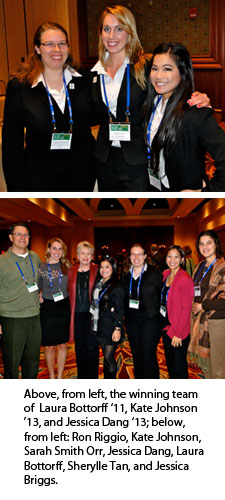 (Note: This year's winning team will re-present their analysis at 11 a.m. on Thursday, Nov. 4 in Seaman Hall 105, as part of the regular, student KLI lunch meeting. The event is open to anyone interested in seeing the award-winning presentation, which uses the new online tool Prezi instead of PowerPoint.)
(Note: This year's winning team will re-present their analysis at 11 a.m. on Thursday, Nov. 4 in Seaman Hall 105, as part of the regular, student KLI lunch meeting. The event is open to anyone interested in seeing the award-winning presentation, which uses the new online tool Prezi instead of PowerPoint.)
For the second year in a row, CMCers have won the undergraduate Leadership Case Competition. The team of Laura Bottorff '11, Jessica Dang '13, and Kate Johnson '13 bested nine other teams from colleges and universities across the map during the 12tth annual conference of the International Leadership Association in Boston, Mass. Teams from Kansas State University and Peace College finished second and third place, respectively.
The trip was sponsored by the Kravis Leadership Institute at CMC, with assistant director for programs Jessica Briggs '03 serving as team advisor. KLI's interim executive director Sarah Smith Orr, associate director of research and internships Sherylle Tan, and Ron Riggio, the Henry R. Kravis Professor of Leadership and Organizational Psychology, also attended and presented at the conference.
Riggio says preparation is grueling for students. Both graduate and undergraduate competitors work on the case a month before the conference. Then, a week before the competition, teams submit a brief that outlines their analysis of the leadership situation, answers several provided questions, and bullet-points recommendations.
On the first night of the conference, teams presented a poster of their case analysis to a panel of judges. The top three teams were then given more questions to answer and were required to attend conference sessions and incorporate material from research presentations into their case analyses. On the final night, each team made a formal presentation of their case analysis to the same set of judges.
"This experience really gave me the opportunity to think on my feet and enhance my leadership skills, which would not have been possible without the support of my teammates, friends and KLI," said Dang.
"Competing in the student case competition allowed us to take what we learned from conference sessions and apply it to a real-world situation," added Johnson. "It was also an absolutely amazing experience. We were able to meet people from all over the world who were so knowledgeable about leadership development."
It's the second year in a row that CMCers have won the undergraduate division, and the third year they've entered the competition. In 2008their first time competingCMCers finished second after losing to a graduate student team. (Grads and undergrads now compete separately.) Worth noting, Riggio says, is that two of this year's CMC teammates are sophomores, and all three competitors on last year's winning team also were second-year students. "I think this says a lot about the quality of our students and their leadership education at CMC," Riggio says.
"Working through the case and presenting at the conference were both great experiences," Bottorff says. "They helped to expand my understanding of leadership and how to present myself in a professional setting. I think we were all extremely happy that we could represent KLI and CMC so well."
The case used for this competition was Nandan Nilekani: From Infosys to Politics, the story of a man's switch between leadership in the private and public sectors. In 2009 Nilekani was invited by Indian Prime Minister Dr. Manmohan Singh to head the government's Unique Identification Authority of India project (UIDAI), which aims to provide an identity card to a billion citizens. That same year, TIME named Nilekani one of the 100 World's Most Influential People.
Team KLI positioned Nilekani's mission as two-foldthe first being his professional responsibility to manage the unique identification project, and secondly, reestablishing his own personal identity, which he'd lost in the transition between public and private sectors, Team KLI argued.
